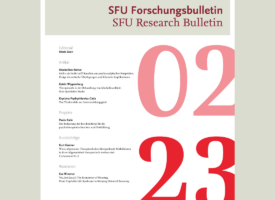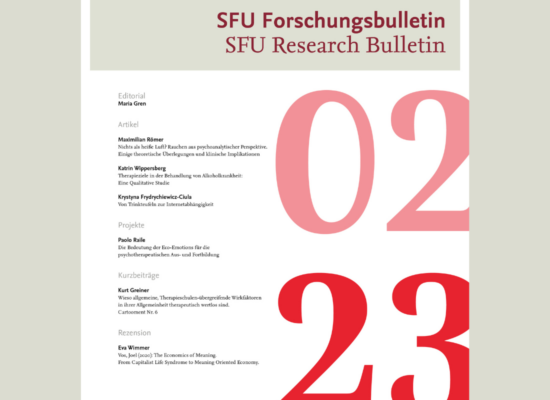We are delighted to present the contributions to our current issue of the SFU Research Bulletin.
Maximilian Römer opens the discourse with an in-depth examination of smoking from a psychoanalytical perspective. Based on historical considerations, he develops a narrative that looks at the development of psychoanalytic theory in the mirror of smoking. In all of this, he spans the arc from drive theory to modern object relations theory and shows how our view of smoking has changed over the course of time. Römer recommends moving away from the prevailing behavioural approach in favour of a psychodynamic perspective that sees smoking as a symptom of deeper psychological conflicts and emphasises the processing of unconscious dynamics. He thus calls on readers to “re-evaluate” the role of the unconscious in addiction treatment.
The second article is also dedicated to an addiction topic – alcohol addiction. As a psychoanalyst, Katrin Wippersberg’s qualitative study on therapy goals in the treatment of alcohol addiction offers an in-depth analysis that sheds light on both the development of alcohol addiction and the various typologies of those affected. Wippersberg emphasises the importance of the patient’s perspective and identifies four central therapy goals: Autonomy, abstinence or somatic health, relationship formation and self-concept. The results are particularly interesting with regard to the primary goals of treatment, which will certainly surprise some people.
In the third article, we focus on the multi-layered nature of addictions. The author, Krystyna Frydrychiewicz-Ciula, devotes her article “From binge drinkers to internet addiction” to the changing nature of addictive behaviour under the influence of social and technological developments. Her discussion of the latest forms of addiction, such as internet addiction, seems particularly relevant. The integrative Gestalt therapist impressively demonstrates how psychotherapy must constantly find new answers to the unforeseeable consequences of new developments and where it must focus its attention.
In the Projects section of our magazine, we find an interesting article that sheds new light on the psychological and psychotherapeutic challenges of our time. Written by Paolo Raile, a recently habilitated psychotherapist, the plea is dedicated to the increasingly present topic of eco-emotions – the emotional reactions to the climate crisis, ranging from fear and anger to sadness and despair. In response to this gap, the article proposes a comprehensive training plan aimed at preparing psychotherapists to adequately treat patients with eco-emotions and integrate them into their therapeutic work.
After the in-depth discussions about various addictions and the psychological effects of the climate crisis, we move on to a lighter but no less insightful section: the short articles. In this section, Kurt Greiner presents us with a Cartooment for the sixth time – a unique and insightful mix of humour and scientific acuity. Greiner’s Cartooment No. 6 sheds light on the controversial question of whether general, cross-therapy factors have any value at all without a specific therapeutic framework. Through the dynamic interaction of the characters Professor Neuromeier and Professor Psychomüller, we are led into a profound discussion in a creative and accessible way and are encouraged to think outside the box.
Our issue closes with a perceptive review by Eva Wimmer. She takes Joel Vos’ work “The Economics of Meaning. From Capitalist Life Syndrome to Meaning Oriented Economy”. So if you’re interested in how economic structures can affect our mental wellbeing and what it means to live in a world that prioritises meaning and purpose over profit, then this review is a must-read.
We hope you enjoy reading this issue!
Contact:
Univ. Ass. Mag. Maria Gren
Sigmund Freud Private University
maria.gren@sfu.ac.at

